back 1
(băk)back 2
(băk)back
(bæk)back
(bæk)back1
(bæk)n.
back2
(bæk)adv.
back
You use back with an intransitive verb to say that someone returns to a place where they were before.
In conversation, instead of saying that someone will 'come back', you often say that they will be back.
Be Careful!
You never use 'back' with the verb return. You do not say, for example, 'He returned back to his office'. You say 'He returned to his office'.
You use back with a transitive verb to say that someone or something is taken or sent to a place where they were before. Back usually goes after the direct object.
When the direct object is a pronoun, back always goes after it.
However, when the direct object is a long noun group, or a noun group followed by a relative clause, you put back in front of the noun group.
Back can also be used to say that someone or something returns to a state they were in before.
Back is also a noun. Your back is the part of your body from your neck to your waist that is on the opposite side to your chest and stomach.
The back of an object is the side or part that is towards the rear or farthest from the front.
The back of a door is the side which faces into a room or cupboard.
The back of a piece of paper is the side which has no writing on, or the side which you look at second.
Note that in British English you do not talk about the 'back side' of a door or piece of paper. However, in American English, this construction is common.
back
Past participle: backed
Gerund: backing
| Imperative |
|---|
| back |
| back |
| Noun | 1. |  back - the posterior part of a human (or animal) body from the neck to the end of the spine; "his back was nicely tanned" back - the posterior part of a human (or animal) body from the neck to the end of the spine; "his back was nicely tanned"saddle - posterior part of the back of a domestic fowl body part - any part of an organism such as an organ or extremity torso, trunk, body - the body excluding the head and neck and limbs; "they moved their arms and legs and bodies" small - the slender part of the back lat, latissimus dorsi - a broad flat muscle on either side of the back dorsal vertebra, thoracic vertebra - one of 12 vertebrae in the human vertebral column; thoracic vertebrae extend from the seventh cervical vertebra down to the first lumbar vertebra lumbar vertebra - one of 5 vertebrae in the human vertebral column; lumbar vertebrae extend from the twelfth thoracic vertebra down to the sacral vertebrae |
| 2. | back - the side that goes last or is not normally seen; "he wrote the date on the back of the photograph" side - an extended outer surface of an object; "he turned the box over to examine the bottom side"; "they painted all four sides of the house" | |
| 3. |  back - the part of something that is furthest from the normal viewer; "he stood at the back of the stage"; "it was hidden in the rear of the store" back - the part of something that is furthest from the normal viewer; "he stood at the back of the stage"; "it was hidden in the rear of the store"position, place - the particular portion of space occupied by something; "he put the lamp back in its place" front - the part of something that is nearest to the normal viewer; "he walked to the front of the stage" | |
| 4. | 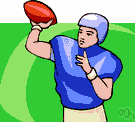 back - (football) a person who plays in the backfield back - (football) a person who plays in the backfieldfootball, football game - any of various games played with a ball (round or oval) in which two teams try to kick or carry or propel the ball into each other's goal flanker, flanker back - a back stationed wide of the scrimmage line; used as a pass receiver football player, footballer - an athlete who plays American football running back - (football) a back on the offensive team (a fullback or halfback) who tries to advance the ball by carrying it on plays from the line of scrimmage tailback - (American football) the person who plays tailback wingback - (football) the person who plays wingback | |
| 5. | notochord - a flexible rodlike structure that forms the supporting axis of the body in the lowest chordates and lowest vertebrates and in embryos of higher vertebrates chine - backbone of an animal canalis vertebralis, spinal canal, vertebral canal - the canal in successive vertebrae through which the spinal cord passes vertebra - one of the bony segments of the spinal column intervertebral disc, intervertebral disk - a fibrocartilaginous disc serving as a cushion between all of the vertebrae of the spinal column (except between the first two) skeletal structure - any structure created by the skeleton of an organism axial skeleton - the part of the skeleton that includes the skull and spinal column and sternum and ribs | |
| 6. |  back - the protective covering on the front, back, and spine of a book; "the book had a leather binding" back - the protective covering on the front, back, and spine of a book; "the book had a leather binding"book, volume - physical objects consisting of a number of pages bound together; "he used a large book as a doorstop" half binding - book binding in which the spine and part of the sides are bound in one material and the rest in another protective cover, protective covering, protection - a covering that is intend to protect from damage or injury; "they had no protection from the fallout"; "wax provided protection for the floors" three-quarter binding - the spine and much of the sides are a different material from the rest of the cover | |
| 7. |  back - the part of a garment that covers the back of your body; "they pinned a `kick me' sign on his back" back - the part of a garment that covers the back of your body; "they pinned a `kick me' sign on his back"cloth covering - a covering made of cloth | |
| 8. |  back - a support that you can lean against while sitting; "the back of the dental chair was adjustable" back - a support that you can lean against while sitting; "the back of the dental chair was adjustable"cantle - the back of a saddle seat car seat - a seat in a car chair - a seat for one person, with a support for the back; "he put his coat over the back of the chair and sat down" ladder-back - the backrest of a chair that consists of two uprights with connecting slats support - any device that bears the weight of another thing; "there was no place to attach supports for a shelf" | |
| 9. | 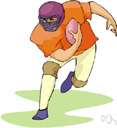 back - (American football) the position of a player on a football team who is stationed behind the line of scrimmage back - (American football) the position of a player on a football team who is stationed behind the line of scrimmageAmerican football, American football game - a game played by two teams of 11 players on a rectangular field 100 yards long; teams try to get possession of the ball and advance it across the opponents goal line in a series of (running or passing) plays position - (in team sports) the role assigned to an individual player; "what position does he play?" line backer, linebacker - (American football) the position of a defensive football player who plays close behind the line of scrimmage field general, quarterback, signal caller - (American football) the position of the football player in the backfield who directs the offensive play of his team; "quarterback is the most important position on the team" fullback - (American football) the position of a back on a football team halfback - (American football) the position of a back on a football team tailback - (American football) the position of the offensive back on a football team who lines up farthest from the line of scrimmage wingback - (American football) the position of the offensive back who lines up behind or outside the end backfield - the offensive football players who line up behind the linemen secondary - the defensive football players who line up behind the linemen | |
| Verb | 1. |  back - be behind; approve of; "He plumped for the Labor Party"; "I backed Kennedy in 1960" back - be behind; approve of; "He plumped for the Labor Party"; "I backed Kennedy in 1960" |
| 2. |  back - travel backward; "back into the driveway"; "The car backed up and hit the tree" back - travel backward; "back into the driveway"; "The car backed up and hit the tree"go, locomote, move, travel - change location; move, travel, or proceed, also metaphorically; "How fast does your new car go?"; "We travelled from Rome to Naples by bus"; "The policemen went from door to door looking for the suspect"; "The soldiers moved towards the city in an attempt to take it before night fell"; "news travelled fast" back out - move out of a space backwards; "He backed out of the driveway" back - cause to travel backward; "back the car into the parking spot" back out - move out of a space backwards; "He backed out of the driveway" | |
| 3. |  back - give support or one's approval to; "I'll second that motion"; "I can't back this plan"; "endorse a new project" back - give support or one's approval to; "I'll second that motion"; "I can't back this plan"; "endorse a new project" | |
| 4. | 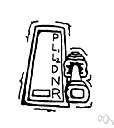 back - cause to travel backward; "back the car into the parking spot" back - cause to travel backward; "back the car into the parking spot"back - travel backward; "back into the driveway"; "The car backed up and hit the tree" bring forward, advance - cause to move forward; "Can you move the car seat forward?" | |
| 5. | 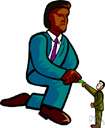 back - support financial backing for; "back this enterprise" back - support financial backing for; "back this enterprise"finance - obtain or provide money for; "Can we finance the addition to our home?" | |
| 6. |  back - be in back of; "My garage backs their yard" back - be in back of; "My garage backs their yard"lie - be located or situated somewhere; occupy a certain position | |
| 7. |  back - place a bet on; "Which horse are you backing?"; "I'm betting on the new horse" back - place a bet on; "Which horse are you backing?"; "I'm betting on the new horse"ante - place one's stake | |
| 8. |  back - shift to a counterclockwise direction; "the wind backed" back - shift to a counterclockwise direction; "the wind backed"veer - shift to a clockwise direction; "the wind veered" | |
| 9. | 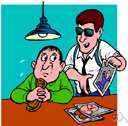 back - establish as valid or genuine; "Can you back up your claims?" back - establish as valid or genuine; "Can you back up your claims?"affirm, confirm, corroborate, substantiate, support, sustain - establish or strengthen as with new evidence or facts; "his story confirmed my doubts"; "The evidence supports the defendant" | |
| 10. | back - strengthen by providing with a back or backing strengthen - gain strength; "His body strengthened" | |
| Adj. | 1. |  back - related to or located at the back; "the back yard"; "the back entrance" back - related to or located at the back; "the back yard"; "the back entrance"posterior - located at or near or behind a part or near the end of a structure aft - (nautical, aeronautical) situated at or toward the stern or tail front - relating to or located in the front; "the front lines"; "the front porch" |
| 2. | 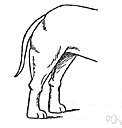 back - located at or near the back of an animal; "back (or hind) legs"; "the hinder part of a carcass" back - located at or near the back of an animal; "back (or hind) legs"; "the hinder part of a carcass"posterior - located at or near or behind a part or near the end of a structure | |
| 3. | 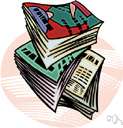 back - of an earlier date; "back issues of the magazine" back - of an earlier date; "back issues of the magazine"noncurrent - not current or belonging to the present time | |
| Adv. | 1. | back - in or to or toward a former location; "she went back to her parents' house" |
| 2. | 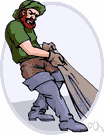 back - at or to or toward the back or rear; "he moved back"; "tripped when he stepped backward"; "she looked rearward out the window of the car" back - at or to or toward the back or rear; "he moved back"; "tripped when he stepped backward"; "she looked rearward out the window of the car" | |
| 3. | back - in or to or toward an original condition; "he went back to sleep" | |
| 4. | 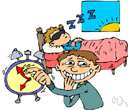 back - in or to or toward a past time; "set the clocks back an hour"; "never look back"; "lovers of the past looking fondly backward" back - in or to or toward a past time; "set the clocks back an hour"; "never look back"; "lovers of the past looking fondly backward" | |
| 5. | 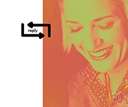 back - in reply; "he wrote back three days later" back - in reply; "he wrote back three days later" | |
| 6. | back - in repayment or retaliation; "we paid back everything we had borrowed"; "he hit me and I hit him back"; "I was kept in after school for talking back to the teacher" |
back
rear head, face, front, fore
support attack, combat, oppose, undermine, weaken, thwart, hinder
adjective dorsal
back
nounverbback down or out
adjective
back
[bæk]I've got a bad back → tengo la espalda mal, tengo un problema de espalda
to shoot sb in the back → disparar a algn por la espalda
he was lying on his back → estaba tumbado boca arriba
to carry sth/sb on one's back → llevar algo/a algn a la espalda
to have one's back to sth/sb → estar de espaldas a algo/algn
with his back to the light → de espaldas a la luz
sitting back to back → sentados espalda con espalda
they laughed at her behind her back → se rieron de ella a sus espaldas
she has been seeing David behind my back → ha estado viendo a David a mis espaldas
to break the back of sth (= do the difficult part) → hacer la peor parte de algo; (= do the main part) → hacer lo más gordo de algo, hacer la mayor parte de algo
to get off sb's back → dejar a algn en paz
to get sb's back up → poner negro a algn, mosquear a algn
to live off the back of sb → vivir a costa de algn
to be on sb's back → estar encima de algn
my boss is always on my back → mi jefe siempre está encima mío
on the back of sth → a consecuencia de algo
shares rose on the back of two major new deals → las acciones subieron a consecuencia de dos nuevos e importantes tratos
to put one's back into sth → poner mucho esfuerzo or empeño en algo
to put one's back into doing sth → esforzarse a tope por hacer algo, emplearse a fondo en hacer algo
to put sb's back up → poner negro a algn, mosquear a algn
to see the back of sb I was glad to see the back of him → me alegró deshacerme de él
the moment or as soon as your back is turned ... → en cuanto te descuidas ...
to have one's back to the wall → estar entre la espada y la pared
see also flat A1
see also stab A1
write your name on the back → escriba su nombre en el reverso
the back of the neck → la nuca
to know sth like the back of one's hand I know Naples like the back of my hand → conozco Nápoles como la palma de la mano
there was damage to the back of the car → la parte trasera or de atrás del coche resultó dañada
at the back (of) [+ building] → en la parte de atrás (de); [+ cupboard, hall, stage] → en el fondo (de)
there's a car park at the back → hay un aparcamiento en la parte de atrás
be quiet at the back! → ¡los de atrás guarden silencio!
they sat at the back of the bus → se sentaron en la parte de atrás del autobús, se sentaron al fondo del autobús
he's at the back of all this trouble → él está detrás de todo este lío
ambition is at the back of it → la ambición es lo que ha causado todo esto
this idea had been at the back of his mind for several days → esta idea le había estado varios días rondándole la cabeza
the ship broke its back → el barco se partió por la mitad
back to front → al revés
you've got your sweater on back to front → te has puesto el jersey al revés
in back of the house (US) → detrás de la casa
in the back of the car → en la parte trasera del coche
I'll sit in the back → yo me sentaré detrás
the toilet's out the back → el baño está fuera en la parte de atrás
they keep the car round the back → dejan el coche detrás de la casa
see also beyond B
see also mind A1
stand back! → ¡atrás!
keep (well) back! (= out of danger) → ¡quédate ahí atrás!
keep back! (= don't come near me) → ¡no te acerques!
meanwhile, back in London/back at the airport → mientras, en Londres/en el aeropuerto
he little suspected how worried they were back at home → qué poco sospechaba lo preocupados que estaban en casa
back and forth → de acá para allá
to go back and forth [person] → ir de acá para allá
there were phone calls back and forth → se hicieron un montón de llamadas el uno al otro
back from the road → apartado de la carretera
back in the 12th century → allá en el siglo XII
it all started back in 1980 → todo empezó ya en 1980 → todo empezó allá en 1980 (liter)
I saw her back in August → la vi el agosto pasado
to be back → volver
when/what time will you be back? → ¿cuándo/a qué hora vuelves?, ¿cuándo/a qué hora estarás de vuelta?
he's not back yet → aún no ha vuelto, aún no está de vuelta
the electricity is back → ha vuelto la electricidad
black is back (in fashion) → vuelve (a estar de moda) el negro, se vuelve a llevar el negro
he went to Paris and back → fue a París y volvió
30 kilometres there and back → 30 kilómetros ida y vuelta
you can go there and back in a day → puedes ir y volver en un día
she's now back at work → ya ha vuelto al trabajo
the kids will be back at school tomorrow → los niños vuelven al colegio mañana
I'll be back by 6 → estaré de vuelta para las 6
I'd like it back → quiero que me lo devuelvan
full satisfaction or your money back → si no está totalmente satisfecho, le devolvemos el dinero
everything is back to normal → todo ha vuelto a la normalidad
I want it back → quiero que me lo devuelvan
see also hit back
she backed the car into the garage → entró el coche en el garaje dando marcha atrás
he backed the car into a wall → dio marcha atrás y chocó con un muro
they found a witness to back his claim → encontraron un testigo que apoyó lo que decía
I'm backing Manchester to win → yo apuesto por que va a ganar el Manchester
to back the wrong horse (lit) → apostar por el caballo perdedor
Russia backed the wrong horse in him (fig) → Rusia se ha equivocado al apoyar a él
to back a winner (lit) → apostar por el ganador
he is confident that he's backing a winner (fig) (person) → está seguro de que está dando su apoyo a un ganador; (idea, project) → está seguro de que va a funcionar bien
he backed into a table → se echó hacia atrás y se dio con una mesa, retrocedió y se dio con una mesa
back boiler N → caldera f pequeña (detrás de una chimenea)
back burner N → quemador m de detrás
to put sth on the back burner → posponer algo, dejar algo para más tarde
back catalogue N (Mus) → catálogo m de grabaciones discográficas
back copy N (Press) → número m atrasado
the back country N (US) → zona f rural (con muy baja densidad de población)
see also back-country back cover N → contraportada f
back door N → puerta f trasera
to do sth by or through the back door → hacer algo de forma encubierta
back formation N (Ling) → derivación f regresiva
back garden N (Brit) → jardín m trasero
back lot N (Cine) → exteriores mpl (del estudio); [of house, hotel, company premises] → solar m trasero
back marker N (Brit) (Sport) → competidor(a) m/f rezagado/a
back matter N [of book] → apéndices mpl
back number N [of magazine, newspaper] → número m atrasado
back page N → contraportada f
back pain N → dolor m de espalda, dolor m lumbar
back passage N (Brit) (euph) → recto m
back pay N → atrasos mpl
back rest N → respaldo m
back road N → carretera f comarcal, carretera f secundaria
back room N → cuarto m interior (fig) lugar donde se hacen investigaciones secretas
back seat N → asiento m trasero, asiento m de atrás
to take a back seat → mantenerse en un segundo plano
back somersault N → salto m mortal hacia atrás
back stop N (Sport) red que se coloca alrededor de una cancha para impedir que se escapen las pelotas
back talk N (US) = backchat back tooth N → muela f
back view N the back view of the hotel is very impressive → el hotel visto desde atrás es impresionante, la parte de atrás del hotel es impresionante
back vowel N (Ling) → vocal f posterior
to back down on sth → echarse atrás en algo, dar marcha atrás en algo
back off! → ¡déjame en paz!, ¡déjame estar!
she asked him to back off and give her some space → le pidió que no le estuviera encima y la dejara respirar
the government has backed off from its decision → el gobierno se ha echado atrás or el gobierno ha dado marcha atrás en su decisión
back
[ˈbæk]to do sth behind sb's back → faire qch derrière le dos de qn
to turn one's back on sb/sth (= abandon) → tourner le dos à qn/qch
to have one's back to the wall, to have one's back against the wall (fig) → être au pied du mur, être le dos au mur
to break the back of a job (British) → faire le gros d'un travail
to get sb's back up (= annoy) → hérisser qn
to get off sb's back → ficher la paix à qn
to be glad to see the back of sb (British) → être content(e) de voir partir qn
The chair has no back → La chaise n'a pas de dossier.
to put one's coat on the back of a chair → mettre son manteau sur le dossier d'une chaise, mettre son manteau sur le dos d'une chaise
to back the winner (lit) → miser sur le gagnant
to back the winner (fig) → miser sur le gagnant
to back one's car into a parking space → garer sa voiture en marche arrière
back wheels [car] → roues fpl arrière
the back wheel of my bike → la roue arrière de mon vélo
back garden → jardin sur l'arrière
Can you move back a little bit? → Pouvez-vous reculer un peu?
to tiptoe back → reculer sur la pointe des pieds
to creep back → reculer en rampant
see also fall back, hang back, step back, turn back
He's back → Il est rentré., Il est de retour.
He's not back yet → Il n'est pas encore rentré.
When will you be back? → Quand seras-tu de retour?
She will be back at work next week
BUT Elle retournera travailler la semaine prochaine.
to run back → revenir en courant
He ran back → Il est revenu en courant.
to walk back
We went there by bus and walked back → Nous y sommes allés en bus et nous sommes rentrés à pied.
can I have it back? → je peux le ravoir?, tu peux me le rendre?
she passed the plate back to Carol → elle a redonné l'assiette à Carol
see also give back
The story starts back in 1950
BUT L'histoire remonte à 1950.
a few years back → il y a quelques années
back in the day → dans le temps
to back down on sth [+ plan, issue,demand] → se rétracter sur qch
The president tried to back down on what he had said → Le président a essayé de se rétracter sur ce qu'il avait dit.
The house backs on to the golf course → Le derrière de la maison donne sur le terrain de golf.
They promised to help us, and then backed out → Ils avaient promis de nous aider et ils se sont désistés.
to back out of sth [+ promise, commitment, deal] → se retirer de qch
If I say I was at your house, will you back me up? → Si je dis que j'étais chez toi, tu peux le confirmer?
back
back
:back
:back
:back
:back
:back
:back
[bæk]he fell on his back → è caduto di schiena
with one's back to the light → con la luce alle spalle
seen from the back → visto/a di spalle
back to back → di spalle (uno/a contro l'altro/a), schiena contro schiena
behind sb's back → alle spalle di qn (fig) → alle spalle or dietro le spalle di qn
to break one's back → rompersi la schiena
to break the back of a job (Brit) → fare il grosso or il peggio di un lavoro
to put one's back into it (fam) → mettercela tutta
to have one's back to the wall (fig) → essere or trovarsi con le spalle al muro
to put sb's back up (fam) → far irritare qn
to get off sb's back (fam) → lasciare qn in pace
I was glad to see the back of him (fam) → ero contento che se ne fosse andato
at the back of the class → in fondo alla classe
back to front → all'incontrario
at the back of my mind was the thought that ... → sotto sotto pensavo che...
it's always there at the back of my mind → è sempre lì, non riesco a togliermelo dalla mente
I know Naples like the back of my hand → conosco Napoli come il palmo della mia mano or come le mie tasche
at the back of beyond (fam) → in capo al mondo
he's at the back of all this → c'è lui dietro a questa storia
back pass (Ftbl) → passaggio indietro
back garden/room → giardino/stanza sul retro (della casa)
back cover → retro della copertina
back kitchen → retrocucina m
on the back page → in ultima pagina
to take a back seat (fig) → restare in secondo piano
he's a back seat driver → sta sempre a criticare chi guida
back street → vicolo
he grew up in the back streets of Glasgow → è cresciuto nei bassifondi di Glasgow
to be back → essere tornato/a
when will you be back? → quando torni?
30 km there and back → 30 km fra andata e ritorno
put it back on the shelf → rimettilo sullo scaffale
she hit him back → gli restituì il colpo
throw the ball back → rilancia la palla
he called back → ha richiamato
can I have it back? → posso riaverlo?
he ran back → tornò indietro di corsa
stand back! → indietro!
back and forth → avanti e indietro
a house set back from the road → una casa che non si affaccia sulla strada
he backed into me → ha fatto un passo indietro e mi è venuto addosso (in car) → mi è venuto addosso a marcia indietro
to back out of sth (undertaking) → sottrarsi a; (deal) → ritirarsi da
back
(bӕk) nounback
→ إِلى الوَرَاء, خَلْف, خَلْفِيّ, ظَهْر, يُطِلُّ ظَهْره على sousedit zezadu, záda, zadní, zadní strana, zpět bag, bag-, ryg, tilbage, vende bagsiden mod Rücken, Rückseite, rückständig, zurück, zurücksetzen μακριά από, πίσω, πίσω θέα, πλάτη atrás, dar a, espalda, lindar por atrás con, parte posterior, posterior, trasero selkä, taka-, takaisin, takana, tukea arrière, dos, être attenant, fond gledati na, leđa, natrag, pozadina, stražnji il retro dà su, indietro, posteriore, retro, schiena 奥, 後ろに, 後ろの, 後退させる, 背中 뒤로, 뒤의, 뒤쪽, 등, 후원하다 achter, achterkant, ergens met de rug naar staan, rug, terug bakover, bakre, bakside, rygg, rygge cofnąć, plecy, tył, tylny, z powrotem apoiar, costas, parte de trás, retroceder, ter as traseiras viradas para, traseiras, traseiro выходить задним фасадом, задний, задняя часть, назад, спина backa, bak-, bakre delen, rygg, tillbaka กลับไปสภาพเดิม, ซึ่งผ่านมาแล้ว ซึ่งอยู่ด้านหลัง, ด้านหลัง, ถอยหลัง สนับสนุน, หลัง ส่วนหลัง arka, arkada, gerilemek, sırt lưng, ở phía sau, phía sau, quay lưng ra, về phía sau 后背, 后退, 后部, 后面的, 向后back
- When should we be back on the bus? (US)
When should we be back on board? (UK) - When do we get back?
- When is the bike due back?
- Please give me my passport back
- Which is the key to the back door? (US)
Which is the key for the back door? (UK) - I want my money back
- I'll call back later
- I'll call back tomorrow
- Please call me back
- I have a bad back (US)
I've got a bad back (UK) - I've hurt my back
- My back is sore
- Shall I come back later?
- We'll be in bed when you get back